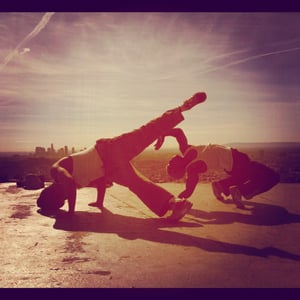 Angela: Thank you for speaking with me today, Charles. I’m intrigued by the diversity of your professional and personal pursuits. You are a capoeira instructor, a poet or spoken word artist, a counselor, and a graduate student. Let me first start with your time at Pacifica. What drew you to the school and what has your experience in the Depth Psychology, Integrative Therapy and Healing Practices Specialization been like so far? Do you know what you’ll be focusing on for your dissertation?
Angela: Thank you for speaking with me today, Charles. I’m intrigued by the diversity of your professional and personal pursuits. You are a capoeira instructor, a poet or spoken word artist, a counselor, and a graduate student. Let me first start with your time at Pacifica. What drew you to the school and what has your experience in the Depth Psychology, Integrative Therapy and Healing Practices Specialization been like so far? Do you know what you’ll be focusing on for your dissertation?
Charles: For my dissertation, I’m doing a phenomenological study about Capoeira Angola. The intention is to produce a description of the multiple ways Capoeira Angola can heal its practitioners from trauma experienced in their lifetime.
When we talk about Capoeira Angola, we’re talking about the mother of Capoeira, as it was birthed in Africa and took shape in Brazil. Some Capoeira teachers believe it may have come from a ritual dance in Angola. I tie in the past because Capoeira Angola is an affect response to trauma, for those who were enslaved and captured, a way to recapture their personhood, their identity and hold onto their culture, their beliefs. Present day, regardless of where practitioners are from, that story still exists for liberation. If we hold onto trauma, we can become victims. The metaphors and archetypes of Capoeira tie into depth psychology. To add to that, you have this collective of people who are with you as a support system. In Capoeira, Angola there is no hierarchical system, no creation of division, everyone is equally important, whether you just started or have been practicing for years. The idea is for all of us to win. You only lose if you lose your cool.
Initially I went to visit Brazil in 2010 because I was interested in pursuing a Ph.D. at UCLA in their "World Arts and Culture" program, and wanted to focus on how the spiritual aspects of capoeira can affect people in their daily lives. When I returned after being there for a month, I realized that spirituality is an individual pursuit. Therefore, with my interest in psychology and spirituality I began to wonder if there was such a thing as spiritual psychology. My counselor at the University of Santa Monica told me about Pacifica, a spirit-based program. I wanted to continue my studies in that vein, where space would be held for a spiritual approach. I already had my own counseling practice, and I wanted to bring in other modalities of healing. After some contemplation, I decided to go with DPT. I want to be the best I can be for me and those I work with.
-1.png?width=300&name=Untitled%20design%20(41)-1.png)
Angela: This past fall, you were the featured poet at the LACPA Mirrors of the Mind, where you performed one of your poems having to do with activism in the Los Angeles area around Black Lives Matter. What was that like, and what function does poetry serve in your life? Is it political activism? A heart song? Both?
Charles: To me, poetry started off as a means of therapy. It was my creative outlet when I felt like I couldn’t speak about what I felt. It was a place where I could put myself and my feelings onto a piece of paper. Another beautiful thing about it is you didn’t have to go any one style. Just be you. Share your story. That’s the initial point. But since poetry gave an outlet to how I felt, I wanted to talk about social activism, love, nature, metaphysics, and quantum physics. Sometimes you can get a poem with all that included.
To be a part of Mirror of the Mind was a great outlet. One of the beautiful things for me was the opportunity to share myself. I realize we’re all connected in the human experience, and I get to put it in the air. It might reach some, not others. We couldn’t leave the house because of the pandemic, but I could share at Mirrors of the Mind. It’s a process being a linguistic artist. First you vision what you’re going to write, then you start painting your picture with words, and then whatever stage you’re on, in person or via zoom, you are now that living piece of art, an extension of what you just wrote. You make a painting, someone can come look. But with poetry, you’re seeing and hearing the art at the same time, my expressions and body movements. Listening to my tone, listening to the words, it’s a whole process when you put it all together. There’s the dance of the words that’s happening. I may be calm, boisterous, dramatic pauses, so there’s that dance.
Angela: Do you find a connection between depth psychology and poetry?
Charles: Yeah! Especially when we talk about metaphor, and going into the unconscious, working with your shadow, the idea of complexes and personas. When you go on stage, you might have a stage name, become someone else. Or when you’re writing, you get to express your pain. It can be a numinous experience. I remember one woman who came to Freedom of Speech Thursdays in Hollywood (an artistic collective I use to produce and host), and she was shaking, needed to make sure this was a safe environment to share her poetry, then she cried. But we held her in that space, and she worked through it. So you see that, the process, it’s a death process, going into the unknown, the ambiguity, your muses or your daemons, whatever you’re bringing through. You’re going through your own liminal process to write. How am I growing, how am I moving forward?
-1.png?width=300&name=Untitled%20design%20(42)-1.png) In a lot of my writing, I talk about the human experience, always looking at what’s happening in the world. I wrote a piece about a single mother doing her best to raise her child in the projects. And one night a stray bullet came in and killed the baby. Did that happen to me personally? No. But stories like that were happening. And being a part of the collective unconscious, what affects one affects us all. After I read that, this gentleman came up to me and said, “Thank you. That happened to me and my son.” Those moments where synchronicities happen. That sticks with me.
In a lot of my writing, I talk about the human experience, always looking at what’s happening in the world. I wrote a piece about a single mother doing her best to raise her child in the projects. And one night a stray bullet came in and killed the baby. Did that happen to me personally? No. But stories like that were happening. And being a part of the collective unconscious, what affects one affects us all. After I read that, this gentleman came up to me and said, “Thank you. That happened to me and my son.” Those moments where synchronicities happen. That sticks with me.
Angela: Your website solsinmotion.com as well as your counseling practice play on the word “soul” by using “sol,” which means sun in Spanish, an apt comparison for the light of the soul. You offer a protocol that you call B.A.D. (Believe, Act, Do), which you describe as “a counseling strategy that assists clients with accessing and achieving and living a soul-centered life.” Tell us a little about your counseling work, and how or if it relates to what you’re studying in Depth Psychology.
Charles: “Sol” does mean sun. We’re all energy, and we’re all light. So how do we keep that going? After trauma or misinterpretations of reality, people may not even perceive the light within themselves. The B.A.D. strategy starts with energy. In order for things to move, you have to give yourself the opportunity to energize yourself. In order to move, to feel we can do something, we have to believe and perceive. Without vision, you’re not going that far. Start to do the research, how can we attain this, move the chain forward, evolve? What will it take? Those are the action steps. Once we have the energy behind it and the research, then we DO.
Take MLK or Malcolm X, those were movements where those people felt a calling, then they did the work needed, and implemented. Even to this day, these two people are revered, not just for who they were but what they did, the things they overcame. Both met tragic ends, but that was because people felt threatened by them. But look at their body of work. The first thing they did was have a vision. They saw. They believed.
Angela: It’s my understanding Capoeira is a martial arts form that was developed in Brazil, as a way that enslaved Africans could appear to be dancing, when in fact they were practicing a way to defend themselves. Capoeira is beautiful to behold, with music, and incredible feats of grace and strength, as a good deal of the moves require standing on your hands and “fighting” with the feet and legs. How did you find capoeira and what has it been for you? Are you of Brazilian descent or was this something you found in the United States?
Charles: I don’t refer to it as a martial art. I refer to as a healing art. The martial art is an aspect but not the whole. That gets convoluted to compartmentalize it, to simplify it. I don’t see it as that. That’s a western construct. Capoeira is maintaining language, understanding spirituality, cosmology, building community, learning self through songs, how to be able to move within one’s body, and breaking the chains of conditioning of society.
I was introduced to the art when I was 11 and I saw Only the Strong, which was my first time seeing what Capoeira is. The seed was planted. I didn’t know anyone who was doing it, but I knew I wanted to do it. Anything that was African in the Unites States was seen as other, and therefore looked at as being inferior, primitive, savage. It was looked down upon and perceived negatively. I’m a first-generation African, a second-generation Jamaican, but what resonated with me about Capoeira was that it was African. It was DNA, already inside of me, and awakening that was calling me, saying, “This is yours.”
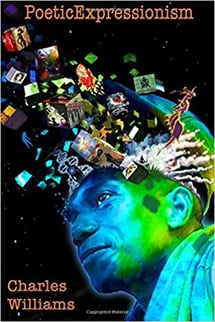 Angela: You’ve written a book out entitled PoeticExpressionism, and are working on your Ph.D. at Pacifica. Are there any other creative events or projects in your future that we might look out for?
Angela: You’ve written a book out entitled PoeticExpressionism, and are working on your Ph.D. at Pacifica. Are there any other creative events or projects in your future that we might look out for?
Charles: The book is out, you can get it on Amazon. I’m working on a Capoeira Freedom School, Inspired by Capoeira Angola and indigenous cosmologies, which is an autonomous, multi-generational, grassroots liberation educational project that integrates lessons of Capoeira into new and old paradigms of resistance and liberation for the freedom of present and future generations (cfcfreedomschool@gmail.com). I’ve been doing community work on self-sustainability by growing fruits, vegetables, and herbs at the El Sereno Community Garden. I’m working on an album called Liberation Therapy, of poetry and music.
Angela: Thank you so much for speaking with me today. Your Pacifica family is so proud of what you’ve accomplished thus far, and we’re looking forward to seeing what you do in the future!
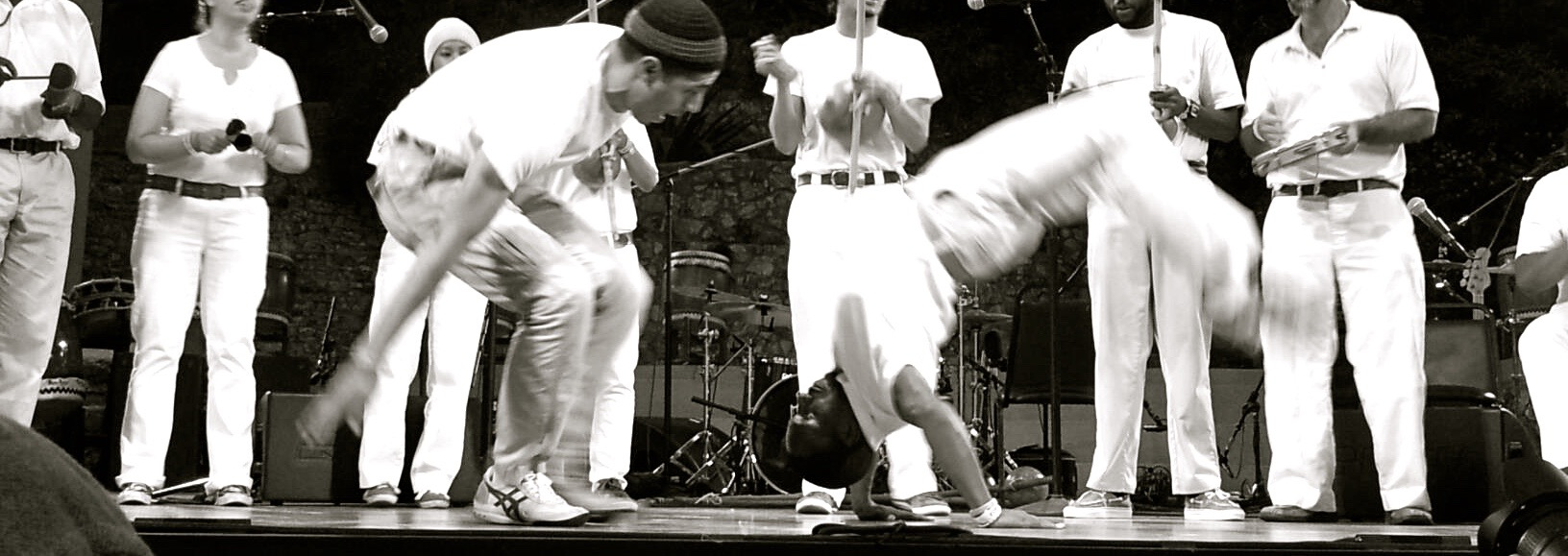
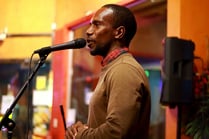 Charles Williams is a doctoral candidate in Depth Psychology focusing on Integrative Therapy and Healing. He has worked as a Life Coach Specialist with developmentally disabled adults. He has also been a Site Coordinator and Supervisor for the Summer Night Lights program sponsored by the LA mayor’s office, a counselor for Boys Town, and he has travelled internationally to Salvador da Bahia, Brazil, to work with the non-profit Levantamos, where he led an outreach effort to aid university students in professional development. He has served as a Producer for several high-profile entities, receiving two back-to-back Emmys for superior performance and success in developing content. solsinmotion.com
Charles Williams is a doctoral candidate in Depth Psychology focusing on Integrative Therapy and Healing. He has worked as a Life Coach Specialist with developmentally disabled adults. He has also been a Site Coordinator and Supervisor for the Summer Night Lights program sponsored by the LA mayor’s office, a counselor for Boys Town, and he has travelled internationally to Salvador da Bahia, Brazil, to work with the non-profit Levantamos, where he led an outreach effort to aid university students in professional development. He has served as a Producer for several high-profile entities, receiving two back-to-back Emmys for superior performance and success in developing content. solsinmotion.com
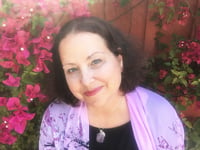
Angela Borda is a writer for Pacifica Graduate Institute, as well as the editor of the Santa Barbara Literary Journal. Her work has been published in Food & Home, Peregrine, Hurricanes & Swan Songs, Delirium Corridor, Still Arts Quarterly, Danse Macabre, and is forthcoming in The Tertiary Lodger and Running Wild Anthology of Stories, Vol. 5.



